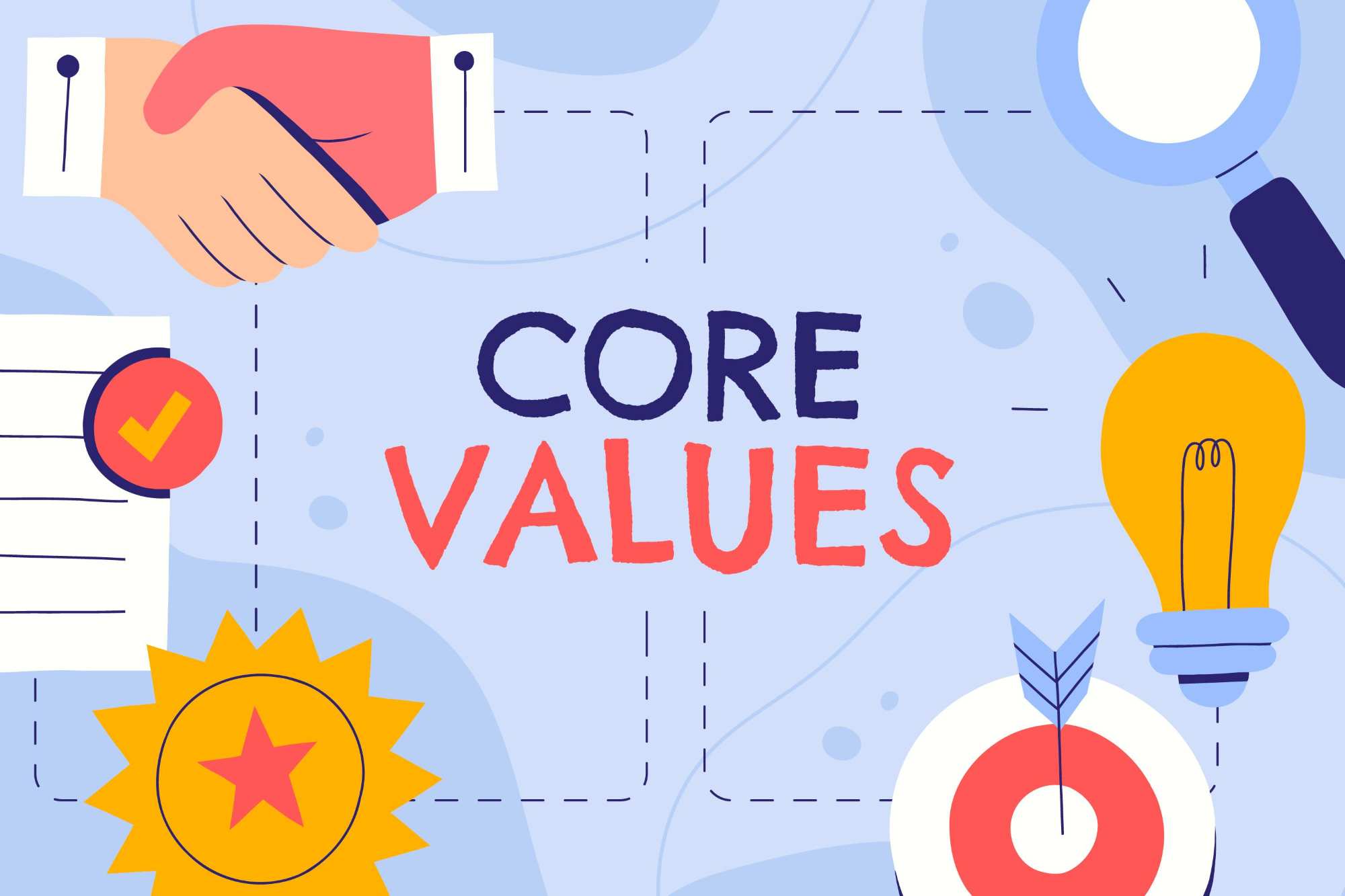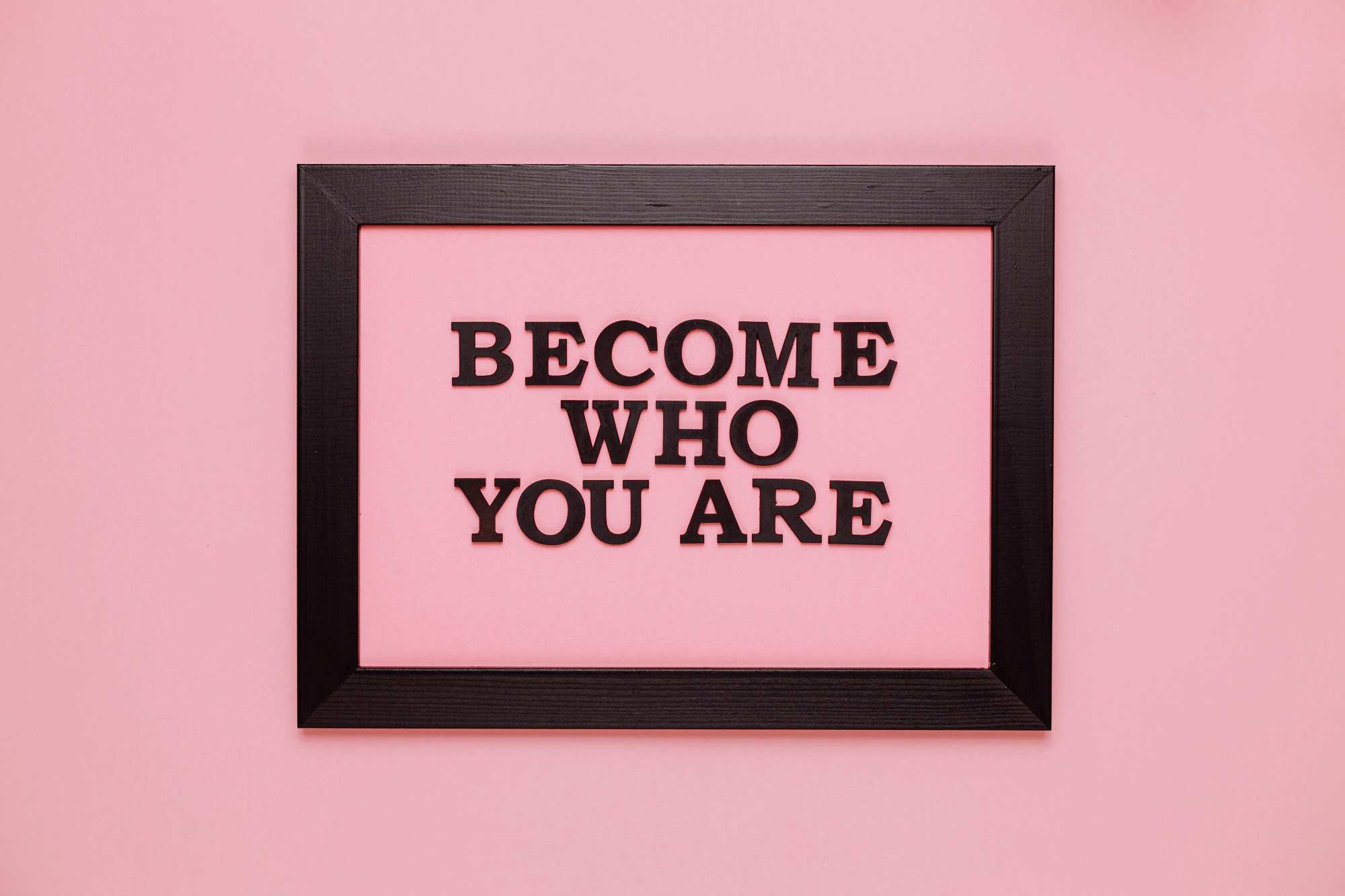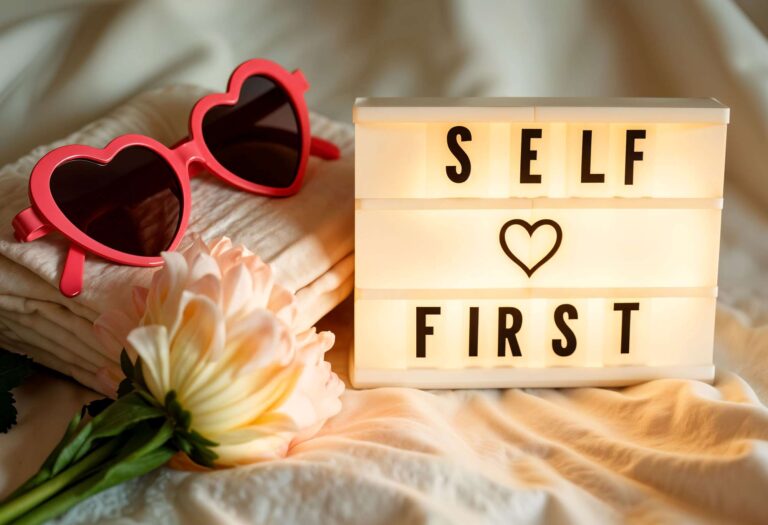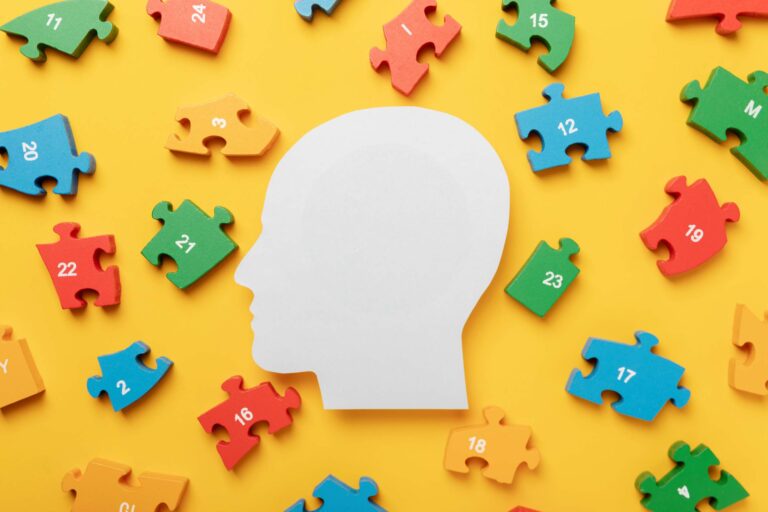What are my core values? The ultimate guide to finding what actually matters to you
“What are my core values?” This question stops most people in their tracks. You make hundreds of decisions every day, but here’s what nobody tells you: Every single choice becomes crystal clear when you know what your core values actually are.
Your values aren’t some feel-good concept from a self-help book. They’re your internal GPS system that either guides you toward a life that feels right, or leaves you constantly questioning why you feel so lost and unfulfilled.
The problem? Most people have never actually figured out what their core values are. They’re making life-changing decisions based on what they think they should want, what their family expects, or what looks impressive to others.
The result? A life that looks successful from the outside but feels empty on the inside.
If you’ve ever felt like you’re living someone else’s life, or you keep achieving things that don’t actually make you happy, or you’re constantly second-guessing your choices – this is probably why. You’re making decisions without knowing what actually matters to you.
Your core values are the 3 to 5 principles that matter most to you when you have to make a tradeoff. To find yours, look at what energizes you, what upsets you, what you admire, and what you refuse to compromise on.
Ready to figure out what your core values really are?
The truth about why most people get personal values wrong
Before we get to the good stuff, let’s clear up the massive misconceptions that keep people stuck.
Myth 1: Values and goals are the same thing
Your values aren’t things you want to achieve – they’re qualities you want to embody. “Getting promoted” isn’t a value. “Growth” or “achievement” might be values that make promotion appealing to you.
Myth 2: Everyone should have the same values
There’s no universal list of “correct” values. Some people value security above all else. Others prioritize adventure. Neither is right or wrong – they’re just different.
Myth 3: Your values should never change
Personal values can evolve as you grow. The values that drove you in your twenties might be completely different from what matters in your forties. This isn’t inconsistency – it’s growth.
Myth 4: Values are just pretty words
Real values guide actual decisions. If you say you value “family” but work 80 hours a week and miss every important event, that’s not really one of your core values – it’s something you think you should value.
Myth 5: You should have lots of values
Trying to live by 15 different values creates decision paralysis. Your core personal values should be the 3-5 things that matter most when you’re forced to choose.

What happens when you don’t know your core values
When you don’t know your personal values, every decision becomes an internal battle. You second-guess yourself constantly because you don’t have clear criteria for what’s right for you.
Here’s what happens when you’re disconnected from your values:
Decision fatigue becomes overwhelming. Without values as a filter, every choice feels equally important and confusing. Should you take that job? Move to that city? End that relationship? Without knowing what matters most to you, these decisions feel impossible.
You attract the wrong opportunities. When you don’t know what you stand for, you say yes to things that look good but feel wrong. You end up in jobs, relationships, and situations that drain your energy instead of energizing you.
Success feels empty. You achieve things that should make you happy but don’t. That’s because you’ve been chasing achievements that align with other people’s values, not your own.
You feel like a fraud. When your actions don’t match your internal truth, you feel inauthentic. You start to wonder who you really are underneath all the roles you’re playing.
You burn out faster. Living against your values is exhausting. It’s like swimming upstream constantly – you can do it for a while, but eventually, you’ll crash.
How to find your core values (step-by-step)
1. Notice what makes you feel alive (and what drains you).
Pay attention to moments when you feel energized, proud, or fully yourself and when you feel like you’re forcing it. Your core values live in the things that light you up and the situations that make you want to disappear.
2. Track your strongest emotional triggers.
The things that make you angry or break your heart? That’s your values talking. If dishonesty makes you furious, integrity matters to you. If seeing someone excluded breaks your heart, belonging or fairness is probably a core value.
3. List what you admire in other people.
Think about people you respect – friends, colleagues, public figures, even fictional characters. What do you admire about them? The qualities you notice in others are often reflections of what you value most.
4. Write your “non-negotiables.”
What are you not willing to compromise on, even when it’s inconvenient? Maybe it’s honesty, even when lying would be easier. Maybe it’s creativity, even when practical makes more sense. Your non-negotiables reveal what you actually value, not just what sounds good on paper.
5. Choose your top 10 values from the list below.
Scan the values list and pick the ones that immediately resonate – the ones that feel like “yes, that’s me.” Don’t overthink it. Your gut knows what matters. Narrow it down to around 10 values that feel most aligned with who you are and how you want to live.
6. Narrow to your top 3 to 5 using tradeoffs.
Now comes the hard part: force yourself to choose. If you had to pick between freedom and security, which wins? Between creativity and stability? Between adventure and belonging? Put your top 10 values head-to-head and see which ones you’re willing to sacrifice and which ones you’ll fight for.
7. Turn each value into a real-life behavior (proof test).
Values aren’t real until they show up in your decisions. For each core value, write down one specific way it influences your life right now. If “authenticity” is a core value, how does it show up? Do you speak up when something feels off? Do you say no to things that require you to fake it? If you can’t name a behavior, it might not actually be a core value – it might just sound nice.
The complete list of core personal values (choose what resonates)
Top core values list
Before we go into the complete breakdown, here are some of the most common core values people resonate with:
Integrity, freedom, security, growth, family, creativity, health, compassion, adventure, stability, authenticity, love, independence, purpose, courage, balance, community, achievement, honesty, peace.
If you see something that immediately clicks, remember it. But don’t stop here – the full list below will help you get specific about what actually drives you.
How to choose from the list
Before you start scanning the complete values list below, here’s how to make this actually useful:
- Circle 10 that feel true now (not what you “should” value). Go with your gut reaction – the ones that make you think “yes, that’s me” without having to convince yourself.
- Cross out any that sound good but don’t show up in your actions. If you say you value adventure but you’ve chosen safety every single time, cross it off. You want values reflected in your actual behavior, not just your aspirations.
- Narrow to 3 to 5 by asking: “If I could only keep one, which wins?” Put your remaining values head-to-head. Freedom vs. security? Creativity vs. stability? Your core values are the ones you refuse to let go of, even when choosing them is hard.
Achievement and growth core values
- Achievement – Accomplishing goals and reaching high standards
- Ambition – Drive to succeed and reach your potential
- Challenge – Taking on difficult tasks and pushing boundaries
- Competition – Striving to win and be the best
- Efficiency – Getting things done with minimal waste of time or energy
- Excellence – Pursuing the highest quality in everything
- Growth – Continuously learning and developing
- Innovation – Creating new ideas and approaches
- Leadership – Guiding and inspiring others
- Mastery – Becoming expert at skills that matter to you
- Performance – Consistently delivering high-quality results
- Persistence – Continuing despite obstacles and setbacks
- Progress – Moving forward and making advancement
- Recognition – Being acknowledged for your contributions
- Success – Achieving your definition of winning
Connection and relationship core values
- Community – Belonging to and contributing to a group
- Compassion – Showing kindness and understanding to others
- Empathy – Understanding and sharing others’ feelings
- Family – Prioritizing close family relationships
- Friendship – Building and maintaining meaningful friendships
- Generosity – Giving freely of time, resources, and energy
- Intimacy – Deep emotional and physical closeness
- Love – Giving and receiving deep affection
- Loyalty – Standing by people and commitments
- Partnership – Working together toward shared goals
- Service – Helping others and contributing to their wellbeing
- Social connection – Building relationships and networks
- Teamwork – Collaborating effectively with others
- Trust – Building reliable, honest relationships
Freedom and independence core values
- Adventure – Seeking new experiences and excitement
- Autonomy – Having control over your own choices
- Choice – Having options and the power to decide
- Flexibility – Adapting easily to changing circumstances
- Freedom – Living without excessive constraints
- Independence – Relying on yourself and making your own way
- Privacy – Having personal space and boundaries respected
- Spontaneity – Acting on impulse and embracing the unexpected
- Travel – Exploring new places and cultures
- Variety – Having diverse experiences and avoiding routine
Security and stability core values
- Comfort – Physical and emotional ease and well-being
- Financial security – Having enough money to feel safe
- Health – Maintaining physical and mental wellbeing
- Order – Having structure and organization in your life
- Peace – Living without conflict or stress
- Predictability – Knowing what to expect
- Routine – Having predictable patterns and structure
- Safety – Protecting yourself and others from harm
- Stability – Having consistency and reliability
- Tradition – Honoring established customs and practices
Personal expression core values
- Authenticity – Being true to who you really are
- Beauty – Appreciating and creating aesthetic experiences
- Creativity – Expressing yourself through original ideas
- Fun – Enjoying life and having good times
- Humor – Finding and sharing laughter
- Individuality – Being unique and standing out from the crowd
- Passion – Pursuing what excites and energizes you
- Playfulness – Maintaining lightness and joy in life
- Self-expression – Sharing your thoughts, feelings, and ideas
- Uniqueness – Embracing what makes you different
Meaning and purpose core values
- Contribution – Making a positive difference in the world
- Faith – Believing in something greater than yourself
- Impact – Creating lasting change
- Learning – Continuously acquiring new knowledge and skills
- Legacy – Leaving something meaningful behind
- Meaning – Finding purpose and significance in what you do
- Purpose – Having a clear reason for your actions
- Spirituality – Connecting with the sacred or transcendent
- Teaching – Sharing knowledge and helping others grow
- Wisdom – Seeking deep understanding and insight
Integrity and character core values
- Courage – Acting despite fear or difficulty
- Fairness – Treating others justly and equally
- Honesty – Being truthful in all situations
- Integrity – Aligning your actions with your beliefs
- Justice – Standing up for what’s right
- Respect – Treating others with dignity
- Responsibility – Taking ownership of your actions and commitments
Mental and emotional well-being core values
- Balance – Maintaining harmony between different life areas
- Emotional intelligence – Understanding and managing emotions well
- Inner peace – Feeling calm and centered internally
- Mindfulness – Being present and aware in each moment
Environmental and lifestyle core values
- Nature – Connecting with and protecting the natural world
- Quality – Choosing fewer but better things and experiences
- Simplicity – Living without unnecessary complexity
- Sustainability – Making choices that support long-term well-being

How to identify YOUR core values in 20 minutes
Now that you have the complete list, here’s how to narrow it down to what actually matters to you:
Step 1: The gut reaction test (5 minutes)
Go through the values list above and quickly circle or write down every value that makes you think “Yes, that’s important to me.” Don’t overthink it – just go with your gut reaction. You should end up with 15-25 values.
Step 2: The life evidence check (10 minutes)
Look at your list and ask for each value: “Do my actions actually reflect this?”
Be honest. If you say you value “family” but haven’t called your parents in months, cross it off. If you say you value “adventure” but you’ve chosen security every time, cross it off. You want values that show up in your actual behavior, not just your wishful thinking.
Behavioral psychology research from American Psychological Association emphasizes the importance of aligning core values with actions.
Step 3: The forced choice method (5 minutes)
Take your remaining values and force yourself to choose. Compare them two at a time: “If I could only honor one of these for the rest of my life, which would I choose?” Keep eliminating until you have your top 5 core values.
Here’s what your final list should look like:
- 5 core values maximum.
- Values that actually show up in your behavior.
- Values that energize you when you think about living them.
- Values that feel like “you” even when others don’t understand them.
Your quick values reality check
Once you have your 5 core values, run them through this reality check:
The energy test: When you imagine living fully by these values, do you feel energized or drained? Values-aligned living should feel challenging but exciting, not exhausting.
The decision test: Think about a recent tough decision you made. Did your choice align with these values? If not, either the decision was wrong for you, or these aren’t actually your core values.
The envy test: When you feel jealous of someone else’s life, which of your values are they living that you’re not? Your envy often points to neglected values.
The non-negotiable test: Would you be willing to sacrifice money, comfort, or approval to honor these values? If not, they’re preferences, not core values.

What to do with your core values now that you know them
Knowing your values is just the beginning. Here’s how to actually use them:
For daily decisions
Before saying yes or no to anything significant, ask: “Does this align with my core values?” If yes, move forward. If no, either decline or find a way to modify it so it does align.
For major life choices
Career decisions: Instead of just looking at salary and prestige, evaluate opportunities based on values alignment. A lower-paying job that honors your core values will often make you happier than a high-paying job that conflicts with who you are.
Relationship decisions: Strong relationships happen when core values align. You don’t need identical values, but your most important values should be compatible.
Where to live: Your location should support your values. If you value community, a remote cabin might not work. If you value nature, a dense urban environment might drain you.
For goal setting
Instead of setting goals based on what you think you should want, use your personal values to guide your goals. Ask: “Which of my core values does this goal serve?” Values-aligned goals feel different – they energize rather than deplete you.
The 5 signs you’re successfully living by your values
When you’re aligned with your personal values, life feels fundamentally different:
- Decision-making becomes clearer and faster. You have a framework for choices, so you spend less time agonizing and second-guessing yourself.
- You feel more energized, even during challenges. Difficult situations that align with your values feel worth the struggle.
- Success feels more satisfying. Achievements that align with your values create lasting satisfaction instead of temporary highs followed by emptiness.
- You trust yourself more. Each values-based decision that works out well builds confidence in your own judgment.
- You’re less affected by others’ opinions. When you’re solid on your own values, external validation becomes nice but not necessary.

Your values-aligned life starts with the next decision
You don’t need to overhaul your entire life overnight. Start with one small decision this week. Before you choose, ask: “Which option aligns better with my core values?”
Maybe it’s saying no to a commitment that drains your energy. Maybe it’s having an honest conversation instead of keeping the peace. Maybe it’s spending money on something that truly matters to you instead of something that just looks impressive.
Each values-aligned choice makes the next one easier. Over time, these small decisions compound into a life that feels authentically yours.
The truth is: You already know your values deep down. This process just helps you get clear on what you’ve always known but maybe never articulated.
You have permission to want what you want. You have permission to prioritize what matters to you. You have permission to build a life that reflects your actual values instead of someone else’s expectations.
Your personal values are your roadmap to a life that feels right from the inside out. The only question is: are you ready to follow them?
Ready to dive deeper into your personal growth journey? Take our ultimate self-discovery quiz to uncover what else might be holding you back, or explore our personal growth workbooks for more transformational exercises like this one.






